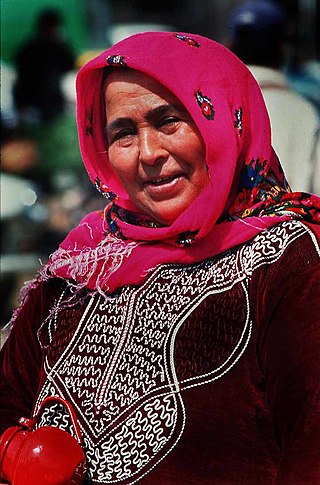Related Research Articles

In modern usage, hijab generally refers to variety of head coverings conventionally worn by many religious Muslim women as an expression of faith. Such women may be called "hijabi". Similar to the mitpaḥat/tichel or snood worn by religious married Jewish women, certain headcoverings worn by some Christian women, such as the mantilla, apostolnik and wimple, and the dupatta favored by many Hindu and Sikh women, the hijab comes in various forms. Often, it specifically describes a scarf that is wrapped around the head, covering the hair, neck, and ears while leaving the face visible. The use of the hijab has grown globally since the 1970s, with many Muslims viewing it as a symbol of modesty and faith; it is also worn as a form of adornment. There is consensus among Islamic religious scholars that covering the head is either required or preferred. In practice, most Muslim women choose to wear it.

Bülent Ersoy is a Turkish singer and actress. She is known as one of the most popular singers of Turkish music, nicknamed Diva by her fans. Ersoy has many famous hits such as "Ümit Hırsızı" (Hope Thief), "Geceler" (Nights), "Beddua" (Curse), "Maazallah" (God Forbid), "Biz Ayrılamayız" (We Cannot Break Up), and "Sefam olsun" (I Enjoy Myself). Ersoy has published more than thirty albums so far and has made a name for herself in Turkish music history.

A headscarf is a scarf covering most or all of the top of a person's, usually women's, hair and head, leaving the face uncovered. A headscarf is formed of a triangular cloth or a square cloth folded into a triangle, with which the head is covered.

Maryam bint Imran is revered in Islam. The Qur'an refers to her seventy times and explicitly identifies her as the greatest woman to have ever lived. Moreover, she is the only woman named in the Quran. In the Quran, her story is related in three Meccan surahs and four Medinan surahs. The nineteenth Surah, Maryam, is named after her.

Filiz Akın is a Turkish actress, writer and TV presenter. Known as Yeşilçam Turkish cinema's "noble, modern, urban and elegant face", Filiz Akın gained a huge fan base in Turkey.

Bahriye Üçok was a Turkish academic of theology, left-wing politician, writer, columnist, and women's rights activist whose assassination in 1990 remains unresolved.

Adalet Ağaoğlu was a Turkish novelist and playwright, considered one of the foremost novelists of 20th-century Turkish literature. She also wrote essays, memoirs, and short stories.
Serenay Sarıkaya is a Turkish actress, model, and beauty pageant titleholder. She is known for the TV series Adanalı, Lale Devri, Medcezir, and Aile. She rose to international prominence with her roles in the series Fi and Şahmaran.
Süleyman Ateş is a Turkish theologian, philosopher, and writer.
Belçim Bilgin is a Kurdish actress from Turkey.
Quranism is an Islamic movement that holds the belief that the Quran is the only valid source of religious belief, guidance, and law in Islam. Quranists believe that the Quran is clear, complete, and that it can be fully understood without recourse to the hadith and sunnah. Therefore, they use the Quran itself to interpret the Quran, an exegetical principle known as tafsir al-Qur'an bi al-Qur'an.
Zaza nationalism is an ideology that supports the preservation of Zaza people between Turks and Kurds in Turkey. The movement also supports the idea that the Zaza people are a different ethnic group from Kurds.

Irreligion in Turkey refers to the extent of the lack, rejection of, or indifference towards religion in the Republic of Turkey. Based on surveys, Islam is the predominant religion and irreligious people form a minority in Turkey. Precise estimates of the share of deists, atheists, agnostics, and other unaffiliated people in the population vary, though in survey averages they constitute a larger percentage than Christians and Jews in the country.

The Good Party is a nationalist and Kemalist political party in Turkey, established on 25 October 2017 by Meral Akşener. The party's name and flag is a reference to the tamga of the Kayı tribe.

Nevşin Mengü is a Turkish journalist and television presenter.
Nihal Bengisu Karaca is a Turkish journalist and author.
National symbols of Turkey are symbols used to represent the citizens of the Republic of Turkey in Turkey and around the world.

Yusuf Tekin is a Turkish bureaucrat and politician. He is the Minister of National Education of the 67th government of Turkey.
Yasemin Beyza Yılmaz, also known as Yasemin Yılmaz or Beyza Yılmaz, is a Turkish sports shooter competing in the 10m air pistol event.

Mustafa Öztürk is a Turkish theologian and academician who worked in the field of exegesis and Quran studies, and produced various scientific works. Öztürk is known for his historicist approach, which advocates that everything related to Islam, especially the Quran, should be interpreted according to their historical context.
References
- ↑ "Başörtüsü bir tavsiyedir vazgeçilmez bir dini emir değil" (in Turkish). sabah.com.tr. 2 October 2006. Archived from the original on 7 March 2012. Retrieved 7 February 2017.
- 1 2 ""Örtünmek Allah'ın emri değil"" (in Turkish). haberturk.com. 28 May 2008. Archived from the original on 20 December 2016. Retrieved 7 February 2017.
- ↑ "Prof. Beyza Bilgin: İslam'da gebeliğin 42. gününe kadar kürtaja izin var" (in Turkish). t24.com.tr. 30 May 2012. Archived from the original on 20 December 2016. Retrieved 7 February 2017.
- ↑ "Beyza Bilgin'in '4 eş' teorisini yıkan tezi tartışılıyor" (in Turkish). haberturk.com. 30 November 2010. Archived from the original on 20 December 2016. Retrieved 7 February 2017.